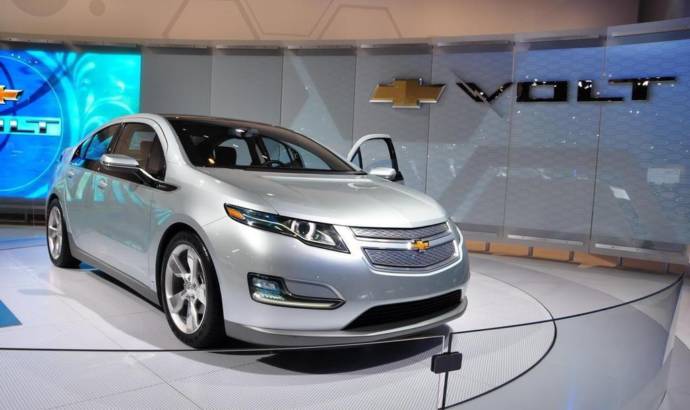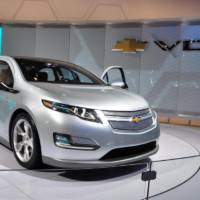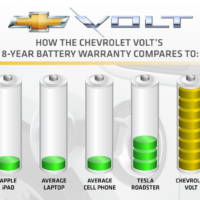GM announced that their upcoming Chevy Volt will be backed by a 8-year or 100,000 miles warranty on its lithium-ion battery pack.
They American manufacturer has also stated that the when a Chevy Volt owner decides to sell his car, the warranty on the battery pack can be transferred to the new owner charge free.
The Chevy Volt warranty that guarantees the battery pack for 100,000 miles or 8-years covers all 161 battery components in addition to the thermal management system, charging system and electric
drive components.
Dealership arrival across U.S. for the Chevy Volt is scheduled towards the fall of 2010 and pricing is expected to start at 40,000 USD.
GM press release :
Brownstown Township, Mich. – The Chevrolet Volt electric vehicle with extended range will provide customers with an unprecedented, standard, eight-year/100,000-mile warranty on its advanced, lithium-ion battery. It is the automotive industry’s longest, most comprehensive battery warranty for an electric vehicle, and is transferable at no cost to other vehicle owners.
“The Chevrolet Volt’s batteries have exceeded our performance targets and are ready to hit the road,” said Micky Bly, GM executive director, global electrical systems. “Our customers are making a commitment to technology that will help reduce our dependence on petroleum. In turn, we are making a commitment to our customers to deliver the highest standards for value, safety, quality, performance and reliability for an unprecedented eight years/100,000 miles.”
The Volt’s comprehensive battery warranty covers all 161 battery components, 95 percent of which are designed and engineered by GM, in addition to the thermal management system, charging system and electric drive components.
The Volt is the only electric vehicle that can operate under a full range of climates and driving conditions without limitations or concern about being stranded by a depleted battery. It has a range of about 340 miles and is powered with electricity at all times. For up to the first 40 miles, the Volt is powered solely by electricity stored in its 16-kWh lithium-ion battery, using no fuel and producing no emissions. When the Volt’s lithium-ion battery runs low, an engine/generator seamlessly operates to extend the driving range another 300 miles on a full tank of fuel. (see Volt Freedom Drive)
The Volt’s advanced, lithium-ion battery is designed to deliver the value, safety, quality, performance, durability and reliability Chevrolet customers expect. Key battery features include:
* Thermal management for durability and reliability: The Volt is the only mass-market electric vehicle with a battery that can be warmed or cooled. The battery is designed to provide reliable operation, when plugged in, at temperatures as low as -13 degrees Fahrenheit (-25 C) and as high as 122 degrees Fahrenheit (+50 C). In cold weather, the battery will be preheated during charging to provide full power capability. In hot weather – the most challenging environment for a battery – the Volt’s battery can be chilled during charging. The Volt’s liquid thermal management system can also be powered during driving by the battery or engine/generator.
* Diagnostics for safety and performance: The Volt’s battery management system continuously monitors the battery real-time for optimum operations. More than 500 diagnostics run at 10 times per second, keeping track of the Volt’s battery pack; 85 percent of the diagnostics ensure the battery pack is operating safely, while the remaining 15 percent keep track of battery performance and life.
* Cell design and chemistry for performance and efficiency: GM’s selection of a prismatic cell design and LG Chem’s manganese spinel lithium-ion chemistry is designed to provide long life and high power output, with a properly maintained temperature. This enables better vehicle acceleration and increased regenerative braking capability for improved vehicle efficiency.
* Energy management for durability: Fully charging or fully depleting a battery shortens its life. The Volt’s energy management system never fully charges or depletes the battery. The Volt’s battery has top and bottom “buffer zones” to help ensure long life.
Testing for durability, reliability, safety and performance
GM engineers have completed more than 1 million miles and 4 million hours of validation testing of Volt battery packs since 2007, as well as each pack’s nine modules and 288 cells. The development, validation and test teams have met thousands of specifications and validated each of the Volt battery’s components.
Tests include short circuit, corrosion, dust, impact, water submersion, crush and penetration, and extreme temperature swings combined with aggressive drive cycles, also known as “Shake, Bake and Roll.”
Ready for production
GM’s Brownstown Township plant, which began building prototype batteries in January, soon will begin regular battery production. (see GM First Battery Build)
"We’re moving fast to deliver for the customer and ensure the Volt launch stays on track,” said Nancy Laubenthal, plant manager of the Brownstown Battery Plant. "Last August we announced the investment in the Brownstown facility and in January built our first completed battery pack. Now we are finishing pre-production batteries and soon we will begin building production batteries for Chevrolet Volts that will be delivered to dealers before the end of the year."
Last year, the U.S. Department of Energy selected 45 companies, universities and organizations in 28 states – including GM’s Brownstown plant – to share more than $2 billion in awards for electric drive and battery manufacturing, and transportation electrification. Nearly half of the awards are designated for cell, battery and materials manufacturing facilities in Michigan.

15 Jul 2010
0




